
The United States Marshals Service (USMS) is a federal law enforcement agency in the United States. The USMS is a bureau within the U.S. Department of Justice, operating under the direction of the attorney general, but serves as the enforcement arm of the U.S. federal courts to ensure the effective operation of the judiciary and integrity of the Constitution. It is the oldest U.S. federal law enforcement agency, created by the Judiciary Act of 1789 during the presidency of George Washington as the "Office of the United States Marshal". The USMS as it stands today was established in 1969 to provide guidance and assistance to U.S. Marshals throughout the federal judicial districts.
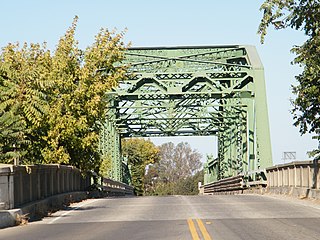
Lathrop is a city located 9 miles (14 km) south of Stockton in San Joaquin County, California, United States. The 2022 California Census reported that Lathrop's population was 30,659. The city is located in Northern California at the intersection of Interstate 5 and California State Route 120, in the San Joaquin Valley.
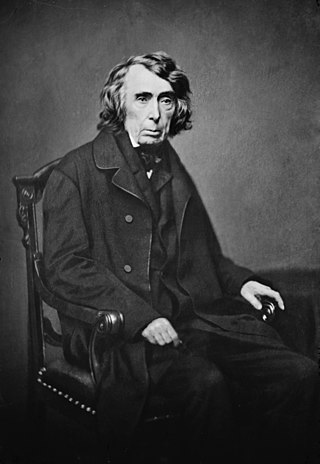
Ex parte Merryman, 17 F. Cas. 144 (No. 9487), was a controversial U.S. federal court case that arose out of the American Civil War. It was a test of the authority of the President to suspend "the privilege of the writ of habeas corpus" under the Constitution's Suspension Clause, when Congress was in recess and therefore unavailable to do so itself. More generally, the case raised questions about the ability of the executive branch to decline enforcement of judicial decisions when the executive believes them to be erroneous and harmful to its own legal powers.
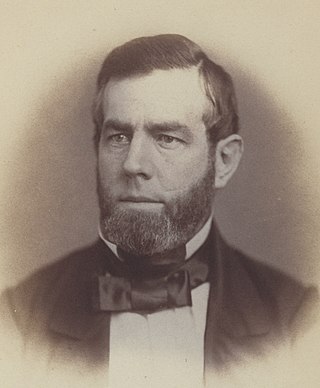
David Colbreth Broderick was an attorney and politician, elected by the legislature as Democratic U.S. Senator from California. Born in Washington, DC, to Irish immigrant parents, he lived in New York until moving to California during the Gold Rush. He was a first cousin of politicians Andrew Kennedy of Indiana and Case Broderick of Kansas. At age 39, Broderick was fatally wounded in a duel with a one-time friend.

David Smith Terry was an American politician and jurist who served as the fourth chief justice of the Supreme Court of California; he was an author of the state's 1879 Constitution.

William Henry Harrison Miller was an American lawyer and Attorney General of the United States.
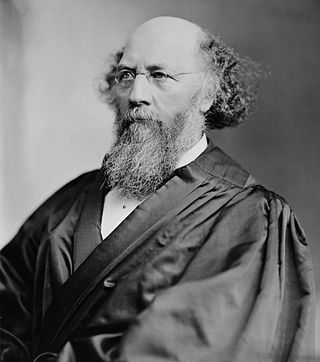
Stephen Johnson Field was an American jurist. He was an Associate Justice of the United States Supreme Court from May 20, 1863, to December 1, 1897, the second longest tenure of any justice. Prior to this appointment, he was the fifth Chief Justice of California.

William Tang Sharon was a United States senator, banker, and business owner from Nevada who profited from the Comstock Lode.
United States v. Shipp, 203 U.S. 563 (1906), were rulings of the Supreme Court of the United States with regard to Sheriff Joseph F. Shipp and five others of Chattanooga, Tennessee, having "in effect aided and abetted" the lynching of Ed Johnson. They were held in contempt of court and sentenced to imprisonment. It remains the only Supreme Court criminal trial in history.
Zachariah "Zach" Montgomery was a publisher, lawyer, politician, and author, particularly known for his skills as an orator.
In United States law, habeas corpus is a recourse challenging the reasons or conditions of a person's confinement under color of law. A petition for habeas corpus is filed with a court that has jurisdiction over the custodian, and if granted, a writ is issued directing the custodian to bring the confined person before the court for examination into those reasons or conditions. The Suspension Clause of the United States Constitution specifically included the English common law procedure in Article One, Section 9, clause 2, which demands that "The privilege of the writ of habeas corpus shall not be suspended, unless when in cases of rebellion or invasion the public safety may require it."
The Government of Guam (GovGuam) is a presidential representative democratic system, whereby the president is the head of state and the governor is head of government, and of a multi-party system. Guam is an organized, unincorporated territory of the United States with policy relations between Guam and the US under the jurisdiction of the Office of Insular Affairs.

The Judiciary of California or the Judicial Branch of California is defined under the California Constitution as holding the judicial power of the state of California which is vested in the Supreme Court, the Courts of Appeal and the Superior Courts. The judiciary has a hierarchical structure with the California Supreme Court at the top, California Courts of Appeal as the primary appellate courts, and the California Superior Courts as the primary trial courts.

Peruta v. San Diego, 824 F.3d 919, was a decision of the United States Court of Appeals for the Ninth Circuit pertaining to the legality of San Diego County's restrictive policy regarding requiring documentation of "good cause" that "distinguish[es] the applicant from the mainstream and places the applicant in harm's way" before issuing a concealed carry permit.
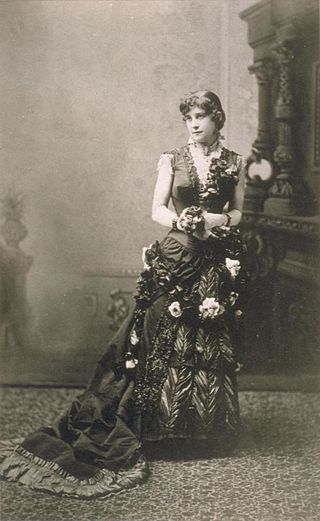
Sarah Althea Hill was a socialite, mistress, and mentally unstable woman with a history of violent behavior who became a national celebrity when she sued millionaire Senator William Sharon for divorce, citing adultery, in 1883. She claimed he had secretly married her three years earlier in a private contract. She was known to carry a small-caliber Colt revolver in her purse and did not hesitate to threaten all who crossed her. The divorce case and related lawsuits set legal precedent and spawned numerous spinoff lawsuits that dragged on for nearly a decade. Two months after Sharon died, she married her attorney David S. Terry.
Fong Yue Ting v. United States, 149 U.S. 698 (1893), decided by the United States Supreme Court on May 15, 1893, was a case challenging provisions in Section 6 of the Geary Act of 1892 that extended and amended the Chinese Exclusion Act of 1882. The provisions in question required Chinese in the United States to obtain certificates of residency, and allowed for the arrest and deportation of Chinese who had failed to obtain these certificates, even if they had not violated any other laws. The case involved writs of habeas corpus from Fong Yue Ting and two other Chinese citizens residing in New York City who were arrested and detained for not having certificates. The Supreme Court decision was in favor of the United States government, upholding the Geary Act and denying the writs of habeas corpus.
Sharp v. Murphy, 591 U.S. ___ (2020), was a Supreme Court of the United States case of whether Congress disestablished the Muscogee (Creek) Nation reservation. After holding the case from the 2018 term, the case was decided on July 9, 2020, in a per curiam decision following McGirt v. Oklahoma that, for the purposes of the Major Crimes Act, the reservations were never disestablished and remain Native American country.

David Butler Neagle was a Deputy U.S. Marshal who, while guarding Associate Supreme Court Justice Stephen J. Field, killed former California Chief Justice David S. Terry when he assaulted Field. Neagle was arrested by the county sheriff and charged with murder. Insisting he was acting within his capacity as a federal marshal, his case went to the U.S. Supreme Court, which in In re Neagle affirmed the executive branch's right to protect judges and the supremacy of federal law over state law.












